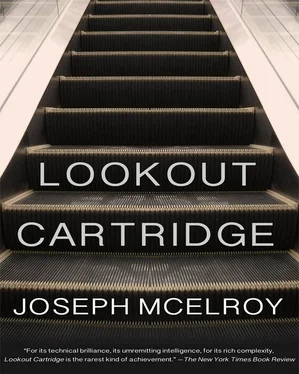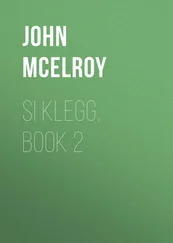Joseph McElroy - Lookout Cartridge
Здесь есть возможность читать онлайн «Joseph McElroy - Lookout Cartridge» весь текст электронной книги совершенно бесплатно (целиком полную версию без сокращений). В некоторых случаях можно слушать аудио, скачать через торрент в формате fb2 и присутствует краткое содержание. Год выпуска: 2014, ISBN: 2014, Издательство: Dzanc Books, Жанр: Современная проза, на английском языке. Описание произведения, (предисловие) а так же отзывы посетителей доступны на портале библиотеки ЛибКат.
- Название:Lookout Cartridge
- Автор:
- Издательство:Dzanc Books
- Жанр:
- Год:2014
- ISBN:9781941088036
- Рейтинг книги:3 / 5. Голосов: 1
-
Избранное:Добавить в избранное
- Отзывы:
-
Ваша оценка:
- 60
- 1
- 2
- 3
- 4
- 5
Lookout Cartridge: краткое содержание, описание и аннотация
Предлагаем к чтению аннотацию, описание, краткое содержание или предисловие (зависит от того, что написал сам автор книги «Lookout Cartridge»). Если вы не нашли необходимую информацию о книге — напишите в комментариях, мы постараемся отыскать её.
Lookout Cartridge — читать онлайн бесплатно полную книгу (весь текст) целиком
Ниже представлен текст книги, разбитый по страницам. Система сохранения места последней прочитанной страницы, позволяет с удобством читать онлайн бесплатно книгу «Lookout Cartridge», без необходимости каждый раз заново искать на чём Вы остановились. Поставьте закладку, и сможете в любой момент перейти на страницу, на которой закончили чтение.
Интервал:
Закладка:
It took me five minutes to walk past the few cottages and up through the gate to the stones, and then past a post with a Ministry of Monuments plaque which I did not read except the dates 2000–1500 B.C. and felt from the southerly direction in which I now followed the right or west-side of the two lines of stones forming the avenue, weak reminders of the British Museum and the Highgate Scientific Institution with its white paint and peaceful newspaper room visited each morning by a stocky gentleman in a white beard to whom I had nodded for years, and the musty library in the back rooms and a book Jenny had taken out once when she was doing biology that told of plant freaks such as the squirting cucumber that builds up in its interior against its elastic casing such osmotic pressure taking water that anything can set it off — the stalk pops like a plug, and seeds squirt thirteen yards. Not the same thing as a bog-burst where peat or swamp having been bound in by the roots of bushes builds up water pressure till it lets go as a kind of mud flow. Think of a peat bomb.
The gate had no lock, the site no watchman. Few came. For that matter, why guard Stonehenge? Against the Welsh nationalist splinter group planning to return the bluestones to where they were quarried.
I didn’t have to be up in the air to see what I had here at Callanish.
A Celtic cross.
The long lower limb was the so-called avenue, a rungless ladder running roughly north to the arms, which were single lines reaching left or east and right or west. The top limb was another single line of stones pointing over the crest of the headland down toward the inland reach of the sea-loch that on the map looked so like a fjord — I stood here and a sodden paper cup caught my eye, and near it a flap of some plastic covering that seemed to have been half tucked under the next-to-last stone, probably a bag full of orange peel.
At the convergence of the four limbs was the circle of high irregular stones that may have stood for centuries before the cross was added, but more likely was itself added to efface some earlier system of heavenly worship using the avenue and perhaps the east and west single lines, which if true means that the upper limb of the cross was added with the circle. Yet looking at it and moved on a mood by Stonehenge much more even than by our strange scene of it, I couldn’t believe the circle wasn’t the basis. The circle was thirty-some feet across with the Great Menhir my peat man had named guarding the well-like cairn and standing more than twice my height like a freely sculpted quite flatly oblong headstone, its top blade canted upward north to south.
It was all meant. No question there.
Alignments east, west — and from what I’d heard about moon-set seen from here over Mount Clisham I could now just make out its slopes as the weakening light and the dimly dissolving cloud left the peak an issue, one stone of the top limb of the cross was leaning east but the stones were remarkably upright.
Meant, however, by who knew what interlapping desires? The constellation whose rise the red-haired woman had said she would wait for I guessed might be the Pleiades to the east — and the link of this with the end of the nineteen-year cycle of lunar revolution. But that rising here would have been virtually invisible to the naked eye, not just the Electra star always invisible out of shame for having married a human, but the other six daughters too. I ran my hand over the gray speckled roughnesses and looked east. I had loved Jenny too much. But I was not looking for her now. It was the film. But I knew now I was not sorry someone had destroyed the film. But I must know why they had.
A figure was on the road two or three miles to the east.
A man at a distance has no eyes.
If he knew where the Callanish stones from there were he still could not see me standing near the Great Menhir with the ruined tumulus and its pit at my back. From a distance the stones may seem to lean toward one another.
The Indian had not walked all the way so soon.
Maybe my man had met him, turned around, and completed his disquisition on peat.
The Ministry’s 2000 B.C. was doubtless conservative; I did not know if radio-carbon dating had been used at Callanish but I did know that errors in the application of its use to Stonehenge had inclined less conservative archaeologists to start thinking about Stonehenge as being in the vicinity of the Pyramids.
The Indian’s pale trenchcoat was unmistakable if you knew to look for it. This was no time to ponder peat.
I looked toward Clisham, my tea was waiting. I turned back toward home. I reviewed what Krish might do.
Two children outside a cottage waved.
Lower down now I couldn’t see the figure on the road.
The crofter’s widow told me so readily and simply about the red-haired American woman when I sat down to my tea and about the man her husband who had met her here in March, that the news seemed old and meager. I said I knew her. I asked how long she had stayed. As I’d hoped, my host got out the book. It showed five days. The name given was Claire Wheeler, which despite my foresight in not saying the name Jan Graf or Jan Aut made me once more doubt she was Jan. But my host described the man her husband who met her on the fifth day as the same man who had come more than once before to Callanish over a period of a year and who had asked her questions she couldn’t answer about the stones. Had Jenny drunk her water in here?
I looked out the window. I had not seen the Indian. I said, Claire is a painter and Paul is an archaeologist.
My host at once said, Paul , that was his name.
So the red-haired woman had spent the night here with Paul some time after the spring equinox.
The Indian was nowhere in sight when I had a look out the window.
I had had a succession of small courses, chalky white bread and butter, toasted spam and two sausages and a fried egg, biscuits and some kind of currant bread in wedges. It was dark now and a free fatigue was upon me.
The woman did not know where Paul lived. I was too tired for a bath.
I felt as if I had not been quite conscious since Glasgow.
There was no chink for me to float in. I was the means by which two bodies either side of me could merge.
But gods can live on carbohydrates and not get like this.
I was upstairs.
I took off my new shoes sticky and getting stiff.
And at once I woke to moonlight and rain.
I did not have my clothes on and I was in the crisp-packed fresh bed that made me feel as if I’d taken a bath.
I was at the window, and the Indian Krish stood in moonlight in the road outside the widow’s gate and was looking right at me though he may not have seen me in the opacities of curtain and glass. It was as if his eyes had wakened me.
I dressed.
I looked again and he was still standing in the road but not in the same spot, as if he’d been moving till I’d looked.
I lit a match to see my socks and saw the wedding photo on the bureau that I’d seen in the hall upstairs and the room downstairs where I’d eaten. The men in their dark suits with the high shock of dark hair and skinned above the ears.
The front door when I got downstairs stuck as it opened, and I felt the widow’s eyes deep in her room come toward me like the cat-eyes of the Indian in his white trenchcoat as I stepped outside.
I approached him in the road, and he said, Don’t speak, you’ll make a noise. He pointed toward the end of the road where the Ministry’s fenced enclosure began and where the central stones on their eminence showed like negatives of shadows.
I saw, as I looked at Krish, that I’d been conscious only of his eyes.
I’d been the only one at the Callanish megaliths by day. I was with someone by night.
Читать дальшеИнтервал:
Закладка:
Похожие книги на «Lookout Cartridge»
Представляем Вашему вниманию похожие книги на «Lookout Cartridge» списком для выбора. Мы отобрали схожую по названию и смыслу литературу в надежде предоставить читателям больше вариантов отыскать новые, интересные, ещё непрочитанные произведения.
Обсуждение, отзывы о книге «Lookout Cartridge» и просто собственные мнения читателей. Оставьте ваши комментарии, напишите, что Вы думаете о произведении, его смысле или главных героях. Укажите что конкретно понравилось, а что нет, и почему Вы так считаете.












